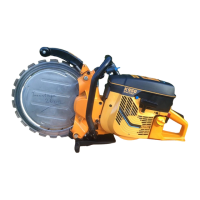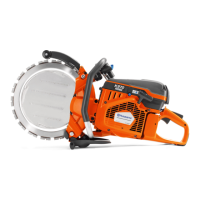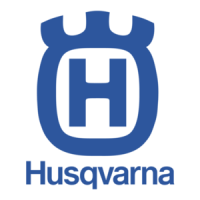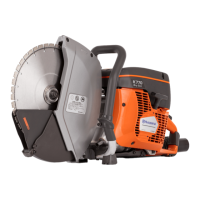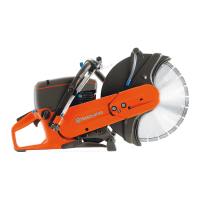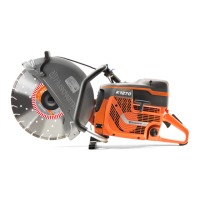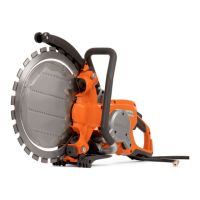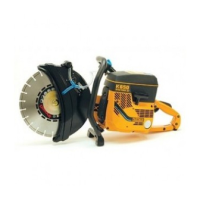Do you have a question about the Husqvarna K960 and is the answer not in the manual?
Illustrations and explanations of symbols used on the machine.
Illustrations and explanations of symbols found within the operator's manual.
Identifies and labels the various parts of the Husqvarna K 960 Chain saw.
Essential checks and preparations before operating the diamond chain saw for the first time.
Details the required personal protective equipment (PPE) for safe operation of the chain saw.
Provides fundamental safety guidelines and best practices for operating the machine.
Ensures a safe working environment, focusing on cleanliness, lighting, and hazard awareness.
Emphasizes operator well-being, including avoiding fatigue, alcohol, and improper attire.
Crucial guidelines for handling fuel safely to prevent fire, explosion, and fume inhalation.
Describes the purpose and checks for the machine's built-in safety features.
Explains the function of the vibration damping system to reduce operator exposure.
Instructions on how to use the stop switch to safely shut off the engine.
Information about the muffler's function, heat, and exhaust gas safety precautions.
Procedures for inspecting and maintaining key safety components of the machine.
Details the function and operation of the throttle trigger lock for preventing accidental acceleration.
Basic safety directions and expert advice for operating the machine effectively.
Importance and procedure for water cooling during operation, including pressure requirements.
Guidance on proper cutting methods, grip, and feed pressure for efficient operation.
Describes the plunge-cut technique for starting cuts into thick objects.
Explains the pilot method for making straight and square cuts, emphasizing the correct blade.
Details the pendulum technique for making cuts using a swinging motion.
Planning work to avoid hazards from falling pieces and workpiece stability.
Technique for cutting small openings in walls, avoiding jamming.
Importance of bracing large pieces to prevent them from falling onto the operator.
Crucial information on understanding and preventing dangerous kickback situations.
Defines kickback and the 'kickback zone' on the cutting blade.
Information on chain types, fitting, and potential hazards like chain breakage.
Checks for saw safety features, correct operation, intended materials, and glazing issues.
Step-by-step guide to properly tension the diamond chain on the saw.
Procedure for replacing the chain and drive rim assembly.
Instructions for correctly tightening the bar nut to ensure chain tension and bar stability.
Information on the correct fuel mixture (petrol and two-stroke oil) and octane rating.
Safe procedures for refuelling the machine, including precautions against fire.
Guidance on the correct process for mixing petrol and two-stroke oil.
Pre-start checks and safety considerations before operating the machine.
Detailed steps for starting the engine, including choke and starter cord usage.
Instructions on how to safely stop the engine using the stop switch.
Details on the carburettor's function, needles, and idle speed adjustment.
Information on the fuel filter's location, maintenance, and replacement.
Guidance on cleaning and replacing air filters to maintain engine performance.
Instructions for changing the starter cord and handling the recoil spring safely.
Procedure for tensioning the recoil spring after replacement.
Steps for safely replacing a broken recoil spring in the starter mechanism.
Troubleshooting and maintenance related to the spark plug, including cleaning and gap adjustment.
Explanation of the cooling system and its components, and cleaning procedures.
Description of the muffler's role and safety considerations regarding exhaust gases.
Daily, weekly, and monthly maintenance tasks to keep the machine in good working order.
Detailed technical data for the engine, ignition, and fuel systems.
Noise and vibration levels measured during operation.
Technical details for the bar and diamond chain.
Declaration of compliance with relevant EU directives and applied standards.
| Engine Type | 2-stroke |
|---|---|
| Fuel Tank Capacity | 0.95 l |
| Sound Pressure Level | 104 dB(A) |
| Blade Diameter | 350 mm |
| Vibration Level (Front/Rear Handle) | 4.5 m/s² |
